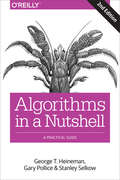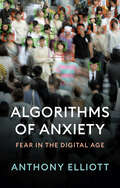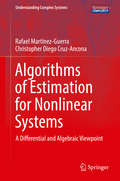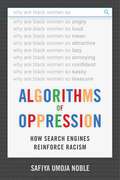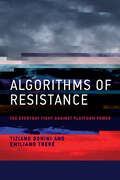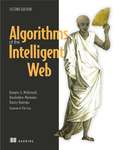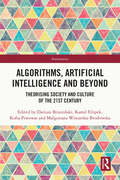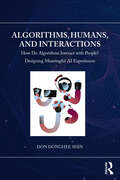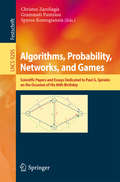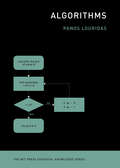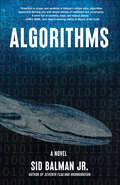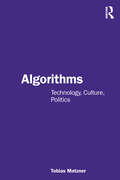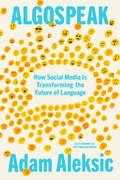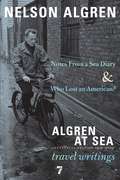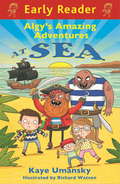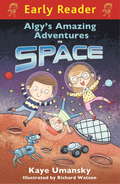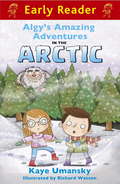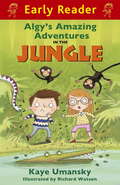- Table View
- List View
Algorithms in a Nutshell: A Practical Guide
by Gary Pollice Stanley Selkow George T. HeinemanCreating robust software requires the use of efficient algorithms, but programmers seldom think about them until a problem occurs. This updated edition of Algorithms in a Nutshell describes a large number of existing algorithms for solving a variety of problems, and helps you select and implement the right algorithm for your needs—with just enough math to let you understand and analyze algorithm performance.With its focus on application, rather than theory, this book provides efficient code solutions in several programming languages that you can easily adapt to a specific project. Each major algorithm is presented in the style of a design pattern that includes information to help you understand why and when the algorithm is appropriate.With this book, you will:Solve a particular coding problem or improve on the performance of an existing solutionQuickly locate algorithms that relate to the problems you want to solve, and determine why a particular algorithm is the right one to useGet algorithmic solutions in C, C++, Java, and Ruby with implementation tipsLearn the expected performance of an algorithm, and the conditions it needs to perform at its bestDiscover the impact that similar design decisions have on different algorithmsLearn advanced data structures to improve the efficiency of algorithms
Algorithms of Anxiety: Fear in the Digital Age
by Anthony ElliottMachine learning algorithms are widely presumed to herald a world in which the crippling burdens of anxiety can be left behind. The digital revolution promises a brave new world where individuals, communities and organizations can at last take control of the future – anticipating, designing and commanding the future, possibly even with mathematical exactitude. Yet, paradoxically, algorithms have unleashed widespread fears and forebodings about the impact of digital technologies. Whether it’s worries about unemployment, distress about social media’s harmful effects on teenagers, or the fear of intrusive digital surveillance, we live in an age of turbo-charged anxiety where the prophecies of algorithms are increasingly enmeshed with fundamental disruption and anxieties about the future. In this book, Anthony Elliott examines how machine learning algorithms are not only transforming global institutions but also rewriting our personal lives. He tells this story through a wide-ranging analysis which takes in ChatGPT, Amazon, the Metaverse, Martin Ford, Netflix, Uber, Bernard Stiegler, Squid Game, Kate Crawford, LaMDA, Byung-Chul Han, autonomous drones, Jean Baudrillard and the automation of warfare. Questioning why people often assume that they need to adopt new technologies in order to lead fulfilling lives, Elliott argues that people may be as much entranced as inspired by their outsourcing of personal decision-making to smart machines.
Algorithms of Education: How Datafication and Artificial Intelligence Shape Policy
by Kalervo N. Gulson P. Taylor Webb Sam SellarA critique of what lies behind the use of data in contemporary education policy While the science fiction tales of artificial intelligence eclipsing humanity are still very much fantasies, in Algorithms of Education the authors tell real stories of how algorithms and machines are transforming education governance, providing a fascinating discussion and critique of data and its role in education policy.Algorithms of Education explores how, for policy makers, today&’s ever-growing amount of data creates the illusion of greater control over the educational futures of students and the work of school leaders and teachers. In fact, the increased datafication of education, the authors argue, offers less and less control, as algorithms and artificial intelligence further abstract the educational experience and distance policy makers from teaching and learning. Focusing on the changing conditions for education policy and governance, Algorithms of Education proposes that schools and governments are increasingly turning to &“synthetic governance&”—a governance where what is human and machine becomes less clear—as a strategy for optimizing education.Exploring case studies of data infrastructures, facial recognition, and the growing use of data science in education, Algorithms of Education draws on a wide variety of fields—from critical theory and media studies to science and technology studies and education policy studies—mapping the political and methodological directions for engaging with datafication and artificial intelligence in education governance. According to the authors, we must go beyond the debates that separate humans and machines in order to develop new strategies for, and a new politics of, education.
Algorithms of Estimation for Nonlinear Systems: A Differential and Algebraic Viewpoint (Understanding Complex Systems)
by Rafael Martínez-Guerra Christopher Diego Cruz-AnconaThis book acquaints readers with recent developments in dynamical systems theory and its applications, with a strong focus on the control and estimation of nonlinear systems. Several algorithms are proposed and worked out for a set of model systems, in particular so-called input-affine or bilinear systems, which can serve to approximate a wide class of nonlinear control systems. These can either take the form of state space models or be represented by an input-output equation. The approach taken here further highlights the role of modern mathematical and conceptual tools, including differential algebraic theory, observer design for nonlinear systems and generalized canonical forms.
Algorithms of Oppression: How Search Engines Reinforce Racism
by Safiya Umoja NobleA revealing look at how negative biases against women of color are embedded in search engine results and algorithms Run a Google search for “black girls”—what will you find? “Big Booty” and other sexually explicit terms are likely to come up as top search terms. But, if you type in “white girls,” the results are radically different. The suggested porn sites and un-moderated discussions about “why black women are so sassy” or “why black women are so angry” presents a disturbing portrait of black womanhood in modern society.In Algorithms of Oppression, Safiya Umoja Noble challenges the idea that search engines like Google offer an equal playing field for all forms of ideas, identities, and activities. Data discrimination is a real social problem; Noble argues that the combination of private interests in promoting certain sites, along with the monopoly status of a relatively small number of Internet search engines, leads to a biased set of search algorithms that privilege whiteness and discriminate against people of color, specifically women of color.Through an analysis of textual and media searches as well as extensive research on paid online advertising, Noble exposes a culture of racism and sexism in the way discoverability is created online. As search engines and their related companies grow in importance—operating as a source for email, a major vehicle for primary and secondary school learning, and beyond—understanding and reversing these disquieting trends and discriminatory practices is of utmost importance.An original, surprising and, at times, disturbing account of bias on the internet, Algorithms of Oppression contributes to our understanding of how racism is created, maintained, and disseminated in the 21st century.
Algorithms of Resistance: The Everyday Fight against Platform Power
by Emiliano Trere Tiziano BoniniHow global workers, influencers, and activists develop tactics of algorithmic resistance by appropriating and repurposing the same algorithms that control our lives.Algorithms are all around us, permeating more and more aspects of our daily lives. While accounts of platform power tend to come across as bleak and monolithic, Algorithms of Resistance shows how people can resist algorithms across a variety of domains. Drawing from rich ethnographic materials and perspectives from both the Global North and South, authors Tiziano Bonini and Emiliano Treré explore how people appropriate and reconfigure algorithms to pursue their objectives in three domains of everyday life: gig work, cultural industries, and politics. They reveal how forms of algorithmic agency and resistance are endemic and mundane and how the platform society is a contested battleground of contrasting forces. Bonini and Treré begin by outlining their key theoretical framework of moral economies. This framework argues that algorithms exist on a continuum. At its two extremes are two competing moral economies: the user moral economy and the platform moral economy. From here, Algorithms of Resistance chronicles the various inventive ways that individuals can work to achieve agency and resist the ubiquitous power of algorithms. Casting a wide net with a diverse range of case studies, Bonini and Treré reveal the moral imperative for all of us—from delivery drivers to artists to social movements—to resist algorithms.
Algorithms of the Intelligent Web
by Doug McIlwraithSummaryAlgorithms of the Intelligent Web, Second Edition teaches the most important approaches to algorithmic web data analysis, enabling you to create your own machine learning applications that crunch, munge, and wrangle data collected from users, web applications, sensors and website logs.Purchase of the print book includes a free eBook in PDF, Kindle, and ePub formats from Manning Publications.About the TechnologyValuable insights are buried in the tracks web users leave as they navigate pages and applications. You can uncover them by using intelligent algorithms like the ones that have earned Facebook, Google, and Twitter a place among the giants of web data pattern extraction.About the BookAlgorithms of the Intelligent Web, Second Edition teaches you how to create machine learning applications that crunch and wrangle data collected from users, web applications, and website logs. In this totally revised edition, you'll look at intelligent algorithms that extract real value from data. Key machine learning concepts are explained with code examples in Python's scikit-learn. This book guides you through algorithms to capture, store, and structure data streams coming from the web. You'll explore recommendation engines and dive into classification via statistical algorithms, neural networks, and deep learning.What's InsideIntroduction to machine learningExtracting structure from dataDeep learning and neural networksHow recommendation engines workAbout the ReaderKnowledge of Python is assumed.About the AuthorsDouglas McIlwraith is a machine learning expert and data science practitioner in the field of online advertising. Dr. Haralambos Marmanis is a pioneer in the adoption of machine learning techniques for industrial solutions. Dmitry Babenko designs applications for banking, insurance, and supply-chain management. Foreword by Yike Guo.Table of ContentsBuilding applications for the intelligent webExtracting structure from data: clustering and transforming your data Recommending relevant contentClassification: placing things where they belongCase study: click prediction for online advertisingDeep learning and neural networksMaking the right choiceThe future of the intelligent webAppendix - Capturing data on the web
Algorithms on Strings, Trees, and Sequences
by Dan GusfieldString algorithms are a traditional area of study in computer science. In recent years their importance has grown dramatically with the huge increase of electronically stored text and of molecular sequence data (DNA or protein sequences) produced by various genome projects. This 1997 book is a general text on computer algorithms for string processing. In addition to pure computer science, the book contains extensive discussions on biological problems that are cast as string problems, and on methods developed to solve them. It emphasises the fundamental ideas and techniques central to today's applications. New approaches to this complex material simplify methods that up to now have been for the specialist alone. With over 400 exercises to reinforce the material and develop additional topics, the book is suitable as a text for graduate or advanced undergraduate students in computer science, computational biology, or bio-informatics. Its discussion of current algorithms and techniques also makes it a reference for professionals.
Algorithms to Live By: The Computer Science of Human Decisions
by Brian Christian Tom GriffithsA fascinating exploration of how computer algorithms can be applied to our everyday lives, helping to solve common decision-making problems and illuminate the workings of the human mindAll our lives are constrained by limited space and time, limits that give rise to a particular set of problems. What should we do, or leave undone, in a day or a lifetime? How much messiness should we accept? What balance of new activities and familiar favourites is the most fulfilling? These may seem like uniquely human quandaries, but they are not: computers, too, face the same constraints, so computer scientists have been grappling with their version of such problems for decades. And the solutions they've found have much to teach us. In a dazzlingly interdisciplinary work, acclaimed author Brian Christian (who holds degrees in computer science, philosophy, and poetry, and works at the intersection of all three) and Tom Griffiths (a UC Berkeley professor of cognitive science and psychology) show how the simple, precise algorithms used by computers can also untangle very human questions. They explain how to have better hunches and when to leave things to chance, how to deal with overwhelming choices and how best to connect with others. From finding a spouse to finding a parking spot, from organizing one's inbox to understanding the workings of human memory, Algorithms to Live By transforms the wisdom of computer science into strategies for human living.
Algorithms, Artificial Intelligence and Beyond: Theorising Society and Culture of the 21st Century (Antinomies)
by Dariusz Brzeziński Kamil Filipek Kuba Piwowar Malgorzata Winiarska-BrodowskaThis volume brings together eminent scholars from various parts of the world, representing different fields of knowledge in order to explore the social, cultural, political and economic effects of the development of new technologies.On the one hand, the book contextualises the discussion of algorithms and artificial intelligence (AI) within the broader framework of the digital revolution, on the other it also examines individual experiences and practices. Moreover, in light of the speed at which algorithms and AI are being incorporated into various aspects of life, contributors also question the ethical implications of their development. The widespread development of AI and algorithmic solutions is one of the most important contemporary phenomena. It has an overwhelming impact on the social and cultural life of the 21st century. In this context, one can point to both exciting examples of the application of algorithms and AI in business and popular culture, as well as the challenges of widening social inequality or the expanding scope of surveillance.The scope of the impact of algorithms and AI makes the formation of new theoretical frameworks vital. This is the aim of this book, which will be of interest to academics within the humanities and social sciences with an interest in technology and the impact of algorithms and AI on society and culture.
Algorithms, Humans, and Interactions: How Do Algorithms Interact with People? Designing Meaningful AI Experiences
by Don Donghee ShinAmidst the rampant use of algorithmization enabled by AI, the common theme of AI systems is the human factor. Humans play an essential role in designing, developing, and operationalizing AI systems. We have a remit to ensure those systems run transparently, perform equitably, value our privacy, and effectively fulfill human needs. This book takes an interdisciplinary approach to contribute to the ongoing development of human–AI interaction with a particular focus on the "human" dimension and provides insights to improve the design of AI that could be genuinely beneficial and effectively used in society. The readers of this book will benefit by gaining insights into various perspectives about how AI has impacted people and society and how it will do so in the future, and understanding how we can design algorithm systems that are beneficial, legitimate, usable by humans, and designed considering and respecting human values. This book provides a horizontal set of guidelines and insight into how humans can be empowered by making choices about AI designs that allow them meaningful control over AI. Designing meaningful AI experiences has garnered great attention to address responsibility gaps and mitigate them by establishing conditions that enable the proper attribution of responsibility to humans. This book helps us understand the possibilities of what AI systems can do and how they can and should be integrated into our society.
Algorithms, Probability, Networks, and Games: Scientific Papers and Essays Dedicated to Paul G. Spirakis on the Occasion of His 60th Birthday (Lecture Notes in Computer Science #9295)
by Christos Zaroliagis Grammati Pantziou Spyros KontogiannisThis Festschrift volume is published in honor of Professor Paul G. Spirakis on the occasion of his 60th birthday. It celebrates his significant contributions to computer science as an eminent, talented, and influential researcher and most visionary thought leader, with a great talent in inspiring and guiding young researchers. The book is a reflection of his main research activities in the fields of algorithms, probability, networks, and games, and contains a biographical sketch as well as essays and research contributions from close collaborators and former PhD students.
Algorithms: A Beginner's Guide (The MIT Press Essential Knowledge series)
by Panos LouridasIn the tradition of Real World Algorithms: A Beginner's Guide, Panos Louridas is back to introduce algorithms in an accessible manner, utilizing various examples to explain not just what algorithms are but how they work.Digital technology runs on algorithms, sets of instructions that describe how to do something efficiently. Application areas range from search engines to tournament scheduling, DNA sequencing, and machine learning. Arguing that every educated person today needs to have some understanding of algorithms and what they do, in this volume in the MIT Press Essential Knowledge series, Panos Louridas offers an introduction to algorithms that is accessible to the nonspecialist reader. Louridas explains not just what algorithms are but also how they work, offering a wide range of examples and keeping mathematics to a minimum.
Algorithms: A Novel (Seventh Flag Trilogy)
by Sid Balman Jr.This final novel in the acclaimed Seventh Flag Trilogy thrusts readers thirty years into the future—a dystopic reality of regional fiefdoms, marauding scavengers, and the quest for ultimate power: the Algorithms of everything, which have been secretly pilfered from an undersea Internet cable, stored on hard drives, and implanted in the last surviving blue whale. Ademar Zarkan—the iconic and unlikely heroine of the American West, now a seventy-year-old woman—leads the Free People of West Texas in an alliance with Native Americans and the indigenous people of northern Mexico to retrieve the hard drives and to rescue her clairvoyant granddaughter from the radicalized Sisterhood and its merciless leader, Mother. But they aren’t the only ones in pursuit of the Algorithms.Haunting and prophetic, Algorithms is a story of violent extremism, resilience, family, and, above all, the interconnectedness of humankind and the natural world.
Algorithms: Technology, Culture, Politics
by Tobias MatznerAlgorithms: Technology, Culture, Politics develops a relational, situated approach to algorithms. It takes a middle ground between theories that give the algorithm a singular and stable meaning in using it as a central analytic category for contemporary society and theories that dissolve the term into the details of empirical studies. The book discusses algorithms in relation to hardware and material conditions, code, data, and subjects such as users, programmers, but also “data doubles”. The individual chapters bridge critical discussions on bias, exclusion, or responsibility with the necessary detail on the contemporary state of information technology. The examples include state-of-the-art applications of machine learning, such as self-driving cars, and large language models such as GPT. The book will be of interest for everyone engaging critically with algorithms, particularly in the social sciences, media studies, STS, political theory, or philosophy. With its broad scope it can serve as a high-level introduction that picks up and builds on more than two decades of critical research on algorithms.
Algospeak: How Social Media Is Transforming the Future of Language
by Adam AleksicFrom linguist Adam Aleksic, known as @etymologynerd on social media, comes a captivating exploration of how internet algorithms are transforming language and communication in unprecedented ways. &“Packed with fascinating facts, of-the-moment observations, and a sparkling voice, Algospeak is a gift to any word nerd. Deftly covering everything from emoji etymologies and trendbait to Taylor Swift fanilects... Adam Aleksic is the wise, yet accessible internet linguistics oracle we need.&”—Amanda Montell, author of The Age of Magical Overthinking and CultishFrom &“brainrot&” memes and incel slang to the trend of adding &“-core&” to different influencer aesthetics, the internet has ushered in an unprecedented linguistic upheaval. We&’re entering an entirely new era of etymology, heralded by the invisible forces driving social media algorithms. Thankfully, Algospeak is here to explain. As a professional linguist, Adam Aleksic understands the gravity of language and the way we use it: he knows the ways it has morphed and changed, how it reflects society, and how, in its everyday usage, we carry centuries of human history on our tongues. As a social media influencer, Aleksic is also intimately familiar with the internet&’s reach and how social media impacts the way we engage with one another. New slang emerges and goes viral overnight. Accents are shaped or erased on YouTube. Grammatical rules, loopholes, and patterns surface and transform language as we know it. Our interactions, social norms, and habits—both online and in person—shift into something completely different.As Aleksic uses original surveys, data, and internet archival research to usher us through this new linguistic landscape, he also illuminates how communication is changing in both familiar and unexpected ways. From our use of emojis to sentence structure to the ways younger generations talk about sex and death (see unalive in English and desvivirse in Spanish), we are in a brand-new world, one shaped by algorithms and technology. Algospeak is an energetic, astonishing journey into language, the internet, and what this intersection means for all of us.
Algramo
by Michael Chu Monica Silva Mariana CalThe company's innovative approach was widely recognized, both locally and internationally. In 2018, Moller was invited to join a prestigious NGO focused on the role of the private sector, which led to an invitation by Unilever Chile's CEO to join forces to meet a corporate-wide Unilever commitment: a 25% reduction by 2025 of the plastics it put out into the world. One of the most efficient ways of doing so was the replacement of single-use plastic packaging by reusable containers, but the challenge was to make consumers remember to take their empty containers with them when shopping. With the insight that people never forget to take their wallets, Moller's response was Packaging-as-a-Wallet (PaaW), a reusable plastic container imbedded with a Radio Frequency Identification (RFID) chip that, through Algramo's smartphone app, could also become a digital wallet. At the same time, the app allowed the user to order the exact amount desired and have it home-delivered by electric tricycle. In January 2020, following a successful pilot test, Unilever Chile and Algramo rolled out PaaW across Santiago, Chile's capital. With plastic pollution a highly visible global issue, Algramo's efforts attracted wide international attention and recognition. Several leading FMCG multinationals and environmental NGOs approached Algramo to explore potential partnerships. For many years, Algramo's financing came through awards and prizes, friends and family and benefactors. At the end of 2019, Algramo completed its first institutional capital-raise in a round led by New York-based impact investor Closed Loop Partners. That relationship opened the doors to projects that would take the Algramo model to New York City. In March 2020, Algramo's board approved a joint venture with a Dutch NGO to deploy Algramo in Indonesia, the world's second-largest source of plastic leakage into the oceans. That same month, Chile registered its first Covid-19 case.
Algren at Sea: Notes from a Sea Diary & Who Lost an American?-Travel Writings
by Nelson AlgrenNelson Algren's two travel writing books describe his journeys through the seamier sides of great American cities and the international social and political landscapes of the mid-1960s. Algren at Sea brings them together in one volume.Notes from a Sea Diary offers one of the most remarkable appraisals of Ernest Hemingway ever written. Aboard the freighter Malayasia Mail, Algren ponders his personal encounter with Hemingway in Cuba and the values inherent in Hemingway's stories as he visits the ports of Pusan, Kowloon, Bombay, and Calcutta.Who Lost an American? is a whirlwind spin through Paris and Playboy clubs, New York publishing and Dublin pubs, Crete and Chicago, as Algren adventures with Simone de Beauvoir, Jean-Paul Sartre, Brendan Behan, and Juliette Gréco.
Algren: A Life
by Mary WisniewskiChicago Writers Association Nonfiction Book of the Year (2017) Society of Midland Authors Literary Award in Biography (2017) A tireless champion of the downtrodden, Nelson Algren, one of the most celebrated writers of the 20th century, lived an outsider's life himself. He spent a month in prison as a young man for the theft of a typewriter; his involvement in Marxist groups earned him a lengthy FBI dossier; and he spent much of his life palling around with the sorts of drug addicts, prostitutes, and poor laborers who inspired and populated his novels and short stories. Most today know Algren as the radical, womanizing writer of The Man with the Golden Arm, which won the first National Book Award, in 1950, but award-winning reporter Mary Wisniewski offers a deeper portrait. Starting with his childhood in the City of Big Shoulders, Algren sheds new light on the writer's most momentous periods, from his on-again-off-again work for the WPA to his stint as an uninspired soldier in World War II to his long-distance affair with his most famous lover, Simone de Beauvoir, to the sense of community and acceptance Algren found in the artist colony of Sag Harbor before his death in 1981. Wisniewski interviewed dozens of Algren's closest friends and inner circle, including photographer Art Shay and author and historian Studs Terkel, and tracked down much of his unpublished writing and correspondence. She unearths new details about the writer's life, work, personality, and habits and reveals a funny, sensitive, and romantic but sometimes exasperating, insecure, and self-destructive artist. The first new biography of Algren in over 25 years, this fresh look at the man whose unique style and compassionate message enchanted readers and fellow writers and whose boyish charm seduced many women is indispensable to anyone interested in 20-century American literature and history.
Algy's Amazing Adventures at Sea (Early Reader)
by Kaye UmanskyEarly Readers are stepping stones from picture books to reading books. A blue Early Reader is perfect for sharing and reading together. A red Early Reader is the next step on your reading journey.There are lots of things Algy doesn't like. He doesn't like bright colours. He doesn't like birds. But at the top of the list of things he doesn't like is the sea.So when Algy, his best friend Cherry and her little brother Brad discover that the shed at the bottom of the garden is taking them on an ocean adventure, he isn't very pleased. But will the sea turn out to be more fun than Algy always thought it was?
Algy's Amazing Adventures in Space (Early Reader)
by Kaye UmanskyEarly Readers are stepping stones from picture books to reading books. A blue Early Reader is perfect for sharing and reading together. A red Early Reader is the next step on your reading journey.What's waiting for Algy at the bottom of his garden this time? With his best friend Cherry and her little brother Brad, Algy opens the loose board at the back of his garden shed - to find himself in space! Cherry and Brad are really excited, but Algy's not so sure. Space seems very dangerous. Will he enjoy his latest adventure or not?
Algy's Amazing Adventures in the Arctic
by Kaye UmanskyEarly Readers are stepping stones from picture books to reading books. A blue Early Reader is perfect for sharing and reading together. A red Early Reader is the next step on your reading journey.Algy can't wait to see what world is waiting for him at the bottom of the garden this time. But when his best friend Cherry shows up with her little brother Brad in tow, he is not impressed. Everyone knows small children just cry and break other people's toys. What use is Brad going to be on an adventure?But in a snowy Arctic world, where monsters lurk and giant footprints lead into the mountains, Algy discovers there might be more to Brad than meets the eye.
Algy's Amazing Adventures in the Arctic (Early Reader)
by Kaye UmanskyEarly Readers are stepping stones from picture books to reading books. A blue Early Reader is perfect for sharing and reading together. A red Early Reader is the next step on your reading journey.Algy can't wait to see what world is waiting for him at the bottom of the garden this time. But when his best friend Cherry shows up with her little brother Brad in tow, he is not impressed. Everyone knows small children just cry and break other people's toys. What use is Brad going to be on an adventure?But in a snowy Arctic world, where monsters lurk and giant footprints lead into the mountains, Algy discovers there might be more to Brad than meets the eye.
Algy's Amazing Adventures in the Jungle
by Kaye UmanskyEarly Readers are stepping stones from picture books to reading books. A blue Early Reader is perfect for sharing and reading together. A red Early Reader is the next step on your reading journey.There are lots of things Algy doesn't like - top of the list is his own name. Algernon is just weird. Pugh sounds a bit like - well, never mind. Other things on his list include: Girls, the Dark, and Having Adventures. So imagine Algy's surprise when he finds a jungle at the bottom of the garden of his new house! And imagine his irritation when his annoying next door neighbour, Cherry - yes, a GIRL - wants to come and explore it with him. She'll only giggle and whisper if he doesn't go with her. But will they ever make it home again?
Algy's Amazing Adventures in the Jungle (Early Reader)
by Kaye UmanskyEarly Readers are stepping stones from picture books to reading books. A blue Early Reader is perfect for sharing and reading together. A red Early Reader is the next step on your reading journey.There are lots of things Algy doesn't like - top of the list is his own name. Algernon is just weird. Pugh sounds a bit like - well, never mind. Other things on his list include: Girls, the Dark, and Having Adventures. So imagine Algy's surprise when he finds a jungle at the bottom of the garden of his new house! And imagine his irritation when his annoying next door neighbour, Cherry - yes, a GIRL - wants to come and explore it with him. She'll only giggle and whisper if he doesn't go with her. But will they ever make it home again?
